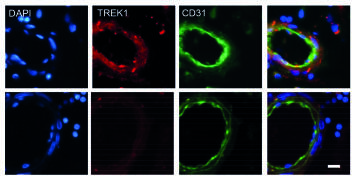Multiple Sclerosis: TWIK-related potassium channel-1 (TREK1) regulates immune-cell trafficking into the CNS

Scientists of Muenster University have found a potassium channel that regulates immune-cell trafficking into the CNS. The activation of this channel could be the first step towards new therapies of Multiple Sclerosis. This was shown by biologists and physicians working with CiM professor Sven Meuth in a study published in Nature Medicine.
„We assume that a complex process leads to the blood brain barrier disruption that causes symptoms in Multiple Sclerosis. I this process endothelial cells that show special ion channels on their surface play a vital role“. In their current study scientists were analyzing the role of the potassium channel TREK-1 for immune cell trafficking via the blood brain barrier (BBB). BBB disruption is a central step in MS pathogenesis. Only when entering the brain immune cells can cause the inflammation that causes MS. “The activation of this channel prohibits immune cell migration”, Dr. Stefan Bittner explains. He and Dr. Tobias Ruck are first authors of the letter published in Nature Medicine.
In Muenster conditions for transferring this scientific knowledge into clinical practice are ideal: „The scientific working groups involved in this project were co-operating excellent – internally as well as with external partners “, says Prof. Heinz Wiendl, head of the department of neurology Muenster. „This project reflects this fruitful co-operation. Within the Cluster of Excellence Cells in Motion - CiM we have closely co-operated with Professor Dr. Thomas Budde und Professor Dr. Hans-Joachim Galla, among our external partners were Professor Dr. Christoph Kleinschnitz from the Department of Neurology Wuerzburg and the pharmacologist Professor Dr. Catherine Heurteaux from Nizza University.“

